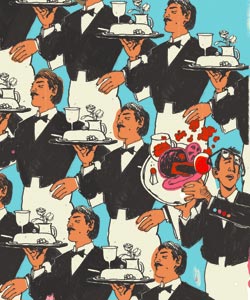
Illustration: Josh Cochran
My first conversation with TRU'S dining room manager is little more than a list of directives: "Wear a dark suit. If you have long hair, comb it back. Arrive at 2:45 p.m. Enter through the building's lobby. Go through the door just past the elevators. Go up a small flight of stairs. . . . "
Such is my introduction to potential employment at a four-star restaurant.
Tru's obsession with details is legendary; the place won the James Beard Foundation's award for outstanding service in 2007, and it has earned glowing reviews since it opened in 1999. So when I saw the ad on Craigslist.com for an entry-level job, I wrote a long explanation of how it wasn't just my passion to be a food runner: It was in my blood. This is half true. My father, a former chef, used to glorify washing dishes as the ideal first job—it builds character. Maybe food running, a small step up, builds a little more.
I'm invited to stage, or audition, which means six hours on the floor, taking food to tables. Simple enough. But this is Tru, where delivering a plate is a meticulously choreographed task—and the last time I worked in a decent restaurant was four and a half years ago in high school in Appleton, Wisconsin, where I fulfilled my father's dishwashing requirement. Sometimes the chef let me chop vegetables.
I wander into Tru five minutes early, in H&M's cheapest suit jacket and a black tie from Target. A cook with a neck tattoo tells me everyone is in a meeting, and a waiter who looks like The Rock suggests that I wait in the lounge. The waiters have yet to turn on the lounge's lights, and I don't know how, so I stand in the dark, beside a velvet chair I'm afraid to sit in.
Eventually, the dining room manager, Paula Purcell, arrives with an application, which I fill out. "You have no experience as a food runner?" she asks while perusing my resumé. I tell her I did "extensive" food running at Filter (a grungy Wicker Park café that once employed me as a barista). At Filter, if you spilled something, you could ease the tension by blaming the customer. Something tells me Paula has never visited Filter.
She leads me to the kitchen table, where a food runner who looks to be three times my age shows me how to set a plate down. Put it down with your right hand, over the guest's right shoulder. Clear the plate using your left hand, on the guest's left side. Always set down and pick up plates simultaneously with the runner across from you. Start with the women. Never carry more than two plates.
Before the first table is seated, the wait staff meets in the dining room. Paula gives a standard pep talk and Chad Ellegood, the wine director, mentions a few special bottles. Then Chad points to a random waiter, names a random wine, and quizzes him. The waiter nails it. "Very good," Ellegood says, looking vaguely disappointed. That concludes the meeting.
I'm led to the kitchen, where I'm told to wait against a wall until given an order. For the first half-hour, the only thing we take out is the amuse bouche, on this night a dish that requires a syringe and blowtorch for preparation. Each time we serve it, a waiter appears at the table, as if he just happened to be walking by, and explains it to the guests.
Every table fills up, and my night becomes a constant rotation from the kitchen to the dining room, and back to the kitchen. There isn't much to remember: table numbers and seat positions, and that's about it. In between runs, Tim Graham, the chef de cuisine, spots me from his sauté station and introduces himself. He is the only person to do this. "Where do you work?" he asks. Here, I say, since I don't really have a job. When he stares, I add, I hope. He wishes me luck, and I feel terribly out of place. By
7:15, I am already unnecessary in Tru's overstaffed kitchen. I end up standing at the wall, wondering why the kitchen has a clock set to Paris time. Is this what character-building feels like?
It's 2:30 a.m. in Paris when Paula relieves me of my post. "How do you think that went?" she asks. Good, I say. I felt really comfortable. I search for the right words to finish the sentence: I felt really comfortable carrying those plates? Trying not to be noticed by guests? Wearing this suit I can't afford? It sounds disingenuous, and it is. Tru is a great restaurant, but if carrying plates around will make me a better person, I could get more mileage by bringing my girlfriend breakfast in bed.
"The waiters said you were very helpful," Paula says. "I'll be doing a few more interviews and I'll call you back within a couple weeks." She never called. I never followed up.


